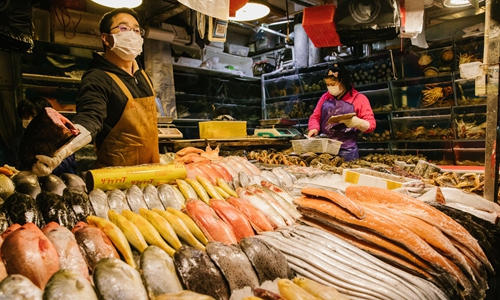US exporters could lose millions from stricter Chinese frozen goods rules
By GT staff reporters Source:Global Times Published: 2020/6/27 18:28:40

A seafood vendor solicits customers in Beijing's Sanyuanli Market in February. Photo: Li Hao/GT
China is imposing a stricter quarantine and management regulation on imported frozen products, which could incur millions of dollars in losses for some US exporters whose seafood products are still under quarantine, industry insiders said. The longer customs inspection procedures could also lead to food spoilage.
But such an impact is short-term as domestic demand remains high, observers noted. They also warned that such rules apply to all exporters regardless of which country they're based, and some media should not politicize Chinese authorities' efforts to contain imported infections amid the latest coronavirus outbreak at a Beijing wholesale food market.
"Chinese Customs inspections have tightened. In the past, about 10 percent of frozen food could be inspected on average at the Shanghai and Tianjin ports. But the inspection rate is now 100 percent," an employee at the Shanghai port surnamed Yu told the Global Times on Saturday. He added that nucleic acid tests are required to prevent contaminated imported food.
The employee noted that the inspection could lead to longer customs clearances, which may spoil perishable items. He estimated that the losses to US exporters could reach millions of dollars in several major ports, including Shanghai, but that the impact would be "short term."
"A huge appetite for agricultural imports remains," Yu explained.
Weng Qiang, a purchasing manager at Sunkfa Holding Group, a leading seafood company based in Beijing, told the Global Times that some imported seafood, regardless of which country they are sourced from, are being held until further notice as part of measures to curb the coronavirus.
A spokesperson for a Shanghai-based fresh food e-commerce platform who spoke on condition of anonymity told the Global Times on Saturday that most of their US fruit imports are proceeding "as usual," but exporters are being asked to provide a guarantee that their products are free from COVID-19 infection. "Most of the large-scale US exporters are very cooperative," he said.
Reuters quoted an industry group representing US produce growers as saying on Friday that some US food suppliers have foregone China contracts over the latter's measures to curb the virus. The report also alluded that China is strengthening the health rule to target US exporters.
"The possibility of contaminated imported seafood or meat to China after packaging and cold-chain transportation is very high, so China is just protecting the safety of its citizens. And the new regulation also applies to all exporters," the e-commerce platform spokesperson said.
The China Aquatic Products Processing and Marketing Alliance (CAPPMA) said that Russia, the US, Norway and Argentina are the four largest seafood exporters to China. During the 12 months ending June 30, 2019, Chinese imports of US seafood reached $969 million, data from industry website thecordovatimes showed.